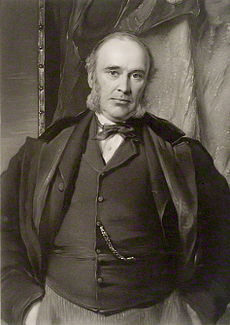William Henry Smith, FRS (24 June 1825 – 6 October 1891) was an English bookseller and newsagent of the family firm W H Smith, who expanded the firm and introduced the practice of selling books and newspapers at railway stations. He was elected a Member of Parliament in 1868 and rose to the position of First Lord of the Admiralty less than ten years thereafter. Because of his lack of naval experience, he was perceived as a model for the character Sir Joseph Porter in H.M.S. Pinafore. In the mid-1880s, he was twice Secretary of State for War, and later First Lord of the Treasury and Leader of the House of Commons, among other posts.
|
William Henry Smith
| |
|---|---|
 | |
| First Lord of the Treasury | |
| In office 14 January 1887 – 6 October 1891 | |
| Monarch | Victoria |
| Prime Minister | The Marquess of Salisbury |
| Preceded by | The Marquess of Salisbury |
| Succeeded by | Arthur Balfour |
| Leader of the House of Commons | |
| In office 14 January 1887 – 6 October 1891 | |
| Monarch | Victoria |
| Prime Minister | The Marquess of Salisbury |
| Preceded by | Lord Randolph Churchill |
| Succeeded by | Arthur Balfour |
| Personal details | |
| Born | (1825-06-24)24 June 1825 London, England |
| Died | 6 October 1891(1891-10-06) (aged 66) |
| Political party | Conservative |
| Spouse(s) | Emily Danvers (1858–1913) |
| Alma mater | None |
| |
The son of William Henry Smith (1792–1865), Smith was born in London. He was educated at Tavistock Grammar School before joining his father's newsagent and book business in 1846, at which time the firm became W H Smith & Son.[1] Both men took advantage of the railway boom by opening news-stands on railway stations, starting with Euston in 1848.[1]
In 1850 the firm opened depots in Birmingham, Manchester and Liverpool. The business became a household name (W H Smith), and Smith junior used the success of the firm as a springboard into politics.[1][2]
In February 1878, he was elected a Fellow of the Royal Society.[3]
In 1868, Smith was elected Member of Parliament for Westminster as a Conservative after an initial attempt to get into Parliament as a "Liberal-Conservative" in 1865 as a supporter of Prime Minister Lord Palmerston.[4] In 1874, Smith was appointed Financial Secretary to the Treasury when Disraeli returned as Prime Minister. In 1877, he became First Lord of the Admiralty even though he never went to sea throughout his life. It has been claimed that Smith's appointment was the inspiration for the character of Sir Joseph Porter, KCB, in Gilbert and Sullivan's 1878 comic opera, H.M.S. Pinafore.
Gilbert had written to Sullivan in December 1877, "The fact that the First Lord in the opera is a Radical of the most pronounced type will do away with any suspicion that W. H. Smith is intended". However, the character was seen as a reflection on Smith, and even Disraeli was overheard to refer to his First Lord as "Pinafore Smith".[5][6] It has been suggested that the Pinafore character was as much based on Smith's controversial predecessor as First Lord, Hugh Childers, as on Smith himself.[7] Smith held the office for three years until the Liberals returned to power.
In 1885, a redistribution of seats led to Smith now standing for the Strand division in Westminster, and he served as Chief Secretary for Ireland for a short period the following year. He was twice Secretary of State for War, the first time during Lord Salisbury's brief ministry between 1885 and 1886, and the second when the Conservatives won the 1886 general election. He succeeded this appointment in 1887 as First Lord of the Treasury and Leader of the House of Commons and became Lord Warden of the Cinque Ports in 1891.
He died shortly afterwards at Walmer Castle, Kent, and his widow was created Viscountess Hambleden in his honour and took the title from the village close to the Smiths' country house of Greenlands, near Henley-on-Thames, Oxon. One of the few ministers personally close to Lord Salisbury (apart from the Salisbury's nephew, Arthur Balfour), Smith was dubbed "Old Morality" because of his austere manner and conduct.
Smith married Emily, daughter of Frederick Dawes Danvers, in 1858. They had two sons and four daughters:
He died in October 1891, aged 66.[citation needed] The following month, his widow was raised to the peerage in his honour as Viscountess Hambleden, of Hambleden in the County of Buckingham. She died in August 1913 and was succeeded by her and Smith's only surviving son, Frederick.
{{cite book}}: CS1 maint: multiple names: authors list (link)| Parliament of the United Kingdom | ||
|---|---|---|
| Preceded by | Member of Parliament for Westminster 1868–1885 |
Succeeded by |
| Preceded by (new constituency) |
Member of Parliament for Strand 1885–1891 |
Succeeded by |
| Political offices | ||
| Preceded by | Financial Secretary to the Treasury 1874–1877 |
Succeeded by |
| Preceded by | First Lord of the Admiralty 1877–1880 |
Succeeded by |
| Preceded by | Secretary of State for War 1885–1886 |
Succeeded by |
| Preceded by | Chief Secretary for Ireland 1886 |
Succeeded by |
| Preceded by | Secretary of State for War 1886–1887 |
Succeeded by |
| Preceded by | First Lord of the Treasury 1887–1891 |
Succeeded by |
| Preceded by | Leader of the House of Commons 1887–1891 | |
| Party political offices | ||
| Preceded by | Conservative Leader in the Commons 1887–1891 |
Succeeded by |
| Honorary titles | ||
| Preceded by | Lord Warden of the Cinque Ports 1891 |
Succeeded by |